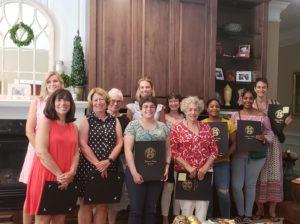 Our advocates here at CASA of Baltimore County are all volunteers who dedicate their hard work and time to helping the youth of the foster care system. These amazing volunteers greatly contribute to the push for better care and the best interests of the foster children in Baltimore County. Our volunteers can sometimes be the only constant part of the children’s lives and they continue to advocate for the child’s wants and needs. Having this kind of support can make a great difference in a child’s life. We are so grateful for the commitment of our volunteers and we want to give them a huge thank you for everything that they do! We also extend this thank you to the CASA volunteers who are working hard across the country!
Our advocates here at CASA of Baltimore County are all volunteers who dedicate their hard work and time to helping the youth of the foster care system. These amazing volunteers greatly contribute to the push for better care and the best interests of the foster children in Baltimore County. Our volunteers can sometimes be the only constant part of the children’s lives and they continue to advocate for the child’s wants and needs. Having this kind of support can make a great difference in a child’s life. We are so grateful for the commitment of our volunteers and we want to give them a huge thank you for everything that they do! We also extend this thank you to the CASA volunteers who are working hard across the country!
“Volunteers don’t get paid, not because they’re worthless, but because they’re priceless”
– Sherry Anderson (Author)
What do CASAs do?
Our CASA (Court Appointed Special Advocate) volunteers first go through a training process, for a total of 30 hours, that consists of classes, learning about CASA, and learning about the children for whom they will be advocating. From the beginning, they are showing their hard work! CASAs work with children in the foster care system not as a lawyer or a social worker, but as a voice for children. CASAs get to know the child so that they can serve as a helpful and supportive force that children in the foster system can always use. A child will meet with their CASA once a month, but generally, CASAs and their CASA children meet more than that. Our CASAs then go to court hearings and write a court report, in which they state what they think is best for the child’s wants and needs. All of our CASA’s hard work goes towards placing children the safest situations and giving them the best opportunities.
“Our CASAs are a part of a team that works to support the youth of Baltimore County”
– Lucretia Scott, Advocate Supervisor
How do CASAs Help?
CASAs provide a friendship for a foster child by giving them someone who they can trust and someone to call when they need support. Children in the foster care system can sometimes be judged by their records. These records tend to highlight any behavioral issues that the child may have had in the past, and do not portray the child as a person. This is where CASAs step in to help. CASAs can provide insight into the child’s life and show that they are more than just a piece of paper. Gwen Farrugia, our Advocate coordinator, notes that “sometimes, the kids believe that they can’t do anything, until someone tells them that they can”. CASAs work to remind their CASA kids of their strengths and help the children realize that they are worth something.
“I have been here for 16 years and have met so many wonderful people. It’s really all about the kid”
– Karen Coleman, Advocate Supervisor
Amazingly, foster children with CASAs tend do better in school, are more likely to be adopted, are less likely to be in long-term foster care, spend less time in foster care, and are more likely to find a permanent home. This is all possible because of the trust between a CASA and their CASA kid. Often, it is difficult for foster children to trust other people, but our CASAs work hard to consistently meet with their CASA kid and ensure the child that they will not abandon them. Karen Coleman, one of our Advocate Supervisors, recalls that one of her CASA volunteers tells her CASA kids “I will never leave you”. This attitude is common among CASAs and adds to our volunteers’ amazing work. It is the responsibility of a CASA to be a voice for the children in any situation, whether it be in school, their foster home, their biological family, or court. A CASA’s advocacy can make the greatest difference in a child’s life.
Want to Become a CASA?
Are you feeling inspired to become a part of something great? Becoming a CASA volunteer is easy! Just click here to fill out the Volunteer Inquiry and check out when training is being held.
